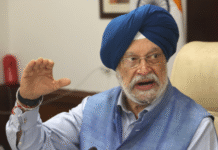Mumbai–Deepening the Indian bond market is a priority for the government, particularly in the face of increased challenges globally, Finance Minister Arun Jaitley said here on Tuesday.
“Among the challenges is the increased evidence of protectionism among developed economies, that are again sending negative signals,” Jaitley said addressing a summit on ways to develop the bond market in the BRICS (Brazil, Russia, India, China, South Africa) group of emerging economies.
Pointing to the British vote in June to leave the European Union (Brexit), Jaitley said: “Besides, the political challenges created by ISIS (Islamic State of Iraq and Syria) have economic ramifications.”
Noting that banks’ resources are constrained by the impact of slowdown in other sectors, Jaitley said the government has accepted “almost all the recommendations made by the Khan panel on corporate bonds”.
The H.R Khan committee on corporate bond market had proposed last month that banks should be allowed to pledge corporate bonds as collateral to borrow funds from the Reserve Bank of India’s (RBI) overnight repo window.
Currently, banks can only pledge government securities to borrow from the RBI, while allowing them to pledge corporate bonds could encourage more buying of the debt by lenders.
“To begin with, the RBI may consider accepting corporate bonds for overnight LAF (liquidity adjustment facility) operations as risks related to rating downgrade and change in market price of the underlying collateral would be minimal. Based on experience gained, it may be extended for long term repos,” the committee said in its report.
With India assuming the chairmanship of BRICS for 2016, its Department of Economic Affairs has organised this conference in partnership with the Confederation of Indian Industry.
Besides, with the New Development Bank (NDB) in place, a key agenda is to foster cooperation among BRICS in the development of financial markets.
“The one-day seminar is to provide a platform to share the best practices from BRICS countries and to explore the global best practices which may be adopted to develop this market,” Jaitley said in a statement on Monday.
Addressing a summit, India’s market regulator said accommodative monetary policies followed by central banks in the developed economies deter international investors from the bond market.
“Given the volatile nature of capital flows, any sneezing by the central banks can create wide fluctuations in the bond market,” Securities & Exchange Board of India (Sebi) Chairman U.K. Sinha said, on ways to develop the bond market in the BRICS group of emerging economies.
“A bond market can only develop if there is international interest in the bond market, but the easy money policies and negative interest rates in some markets are creating uncertainties,” Sinha observed.
Sinha also noted the problem in transmission of unconventional monetary policies to the private sector.
“The broad money supply from 2007 has increased by more than $9 trillion, but the actual flow to the private sector is only $1.8 trillion,” he said.
According to Sinha, the total amount raised via fresh issues of private placement of bonds during the last financial year was at $75 billion. (IANS)







